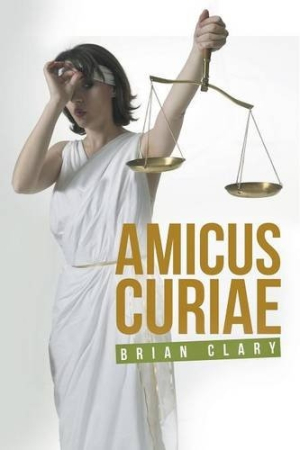Amicus Curiae
This legal thriller is an electrifying examination of human failings in the justice system.
The Texas criminal justice system is splayed open in Brian Clary’s gripping legal thriller, Amicus Curiae. A complex plot, identifiable characters, and a provocative examination of American legal concepts meld together in this intelligent and slowly engrossing novel.
Clary is a trial lawyer by trade, and he uses his experience and expertise to develop his protagonist, Michelle “Mickey” Grant. Recently divorced, Grant is an ambitious trial lawyer who works for a prestigious law firm in Taylor County, Texas. Her life and career are turned upside down when her teenage daughter goes missing during a string of abductions. As prime suspect Willie Lee Flynn is prosecuted for the murder of another young woman, Grant becomes desperate for answers. Her search for her daughter’s whereabouts takes her all the way to death row and into a dangerous battle of wits with Flynn’s lawyers and law enforcement officials working the case.
In the beginning of the novel, the writing is stuffy and melodramatic. Grant exchanges “cordial pleasantries” with the rival lawyer in a corporate civil trial. In another scene, when Grant finds her daughter’s abandoned bicycle outside a mall, prickly leaves of holly bushes “assaulted” her knees. Similarly, some of the early dialogue sounds contrived and clunky, congesting the flow of the story and undermining tension.
But the prose progressively improves as the plot advances. By the time Grant visits Flynn on death row, the writing is lean, agile, and resonant. These pages wring emotion out of prison scenes: “Flynn left the room, but Mickey sat and stared straight ahead, feeling as empty as the space on the other side of the glass.” Likewise, the book strikes the right balance of description and dialogue in developing the relationship between Grant and her ex-husband, Tyler. Turning to each other in their mutual loss, the two characters find touching moments of humor and love.
The most fascinating aspects of the plot revolve around legal concepts of due process, specifically a defendant’s right to adequate counsel, which is the focus of an “amicus brief” in the book’s third act. The dialogue of these later courtroom scenes is electrifying. “All of the resources of the state of Texas stand in opposition to my client’s freedom and, in this instance, pose a threat to his very existence,” says Flynn’s lawyer, Chester Hill. The narrative raises disturbing questions about the treatment of inmates in the criminal justice system. Flynn is repeatedly beaten by fellow prisoners, and no one really stops it or prevents it from happening. Only on death row, in isolation, does he feel safe.
Amicus Curiae achieves what all good fiction should achieve. It uses the elements of story to explore humanity, our motivations and shortcomings, and the conflicts between our idealism and social institutions. That Clary ends the novel with a riveting twist makes it all the better. Amicus Curiae is a superb and powerful legal thriller.
Reviewed by
Scott Neuffer
Disclosure: This article is not an endorsement, but a review. The publisher of this book provided free copies of the book and paid a small fee to have their book reviewed by a professional reviewer. Foreword Reviews and Clarion Reviews make no guarantee that the publisher will receive a positive review. Foreword Magazine, Inc. is disclosing this in accordance with the Federal Trade Commission’s 16 CFR, Part 255.

